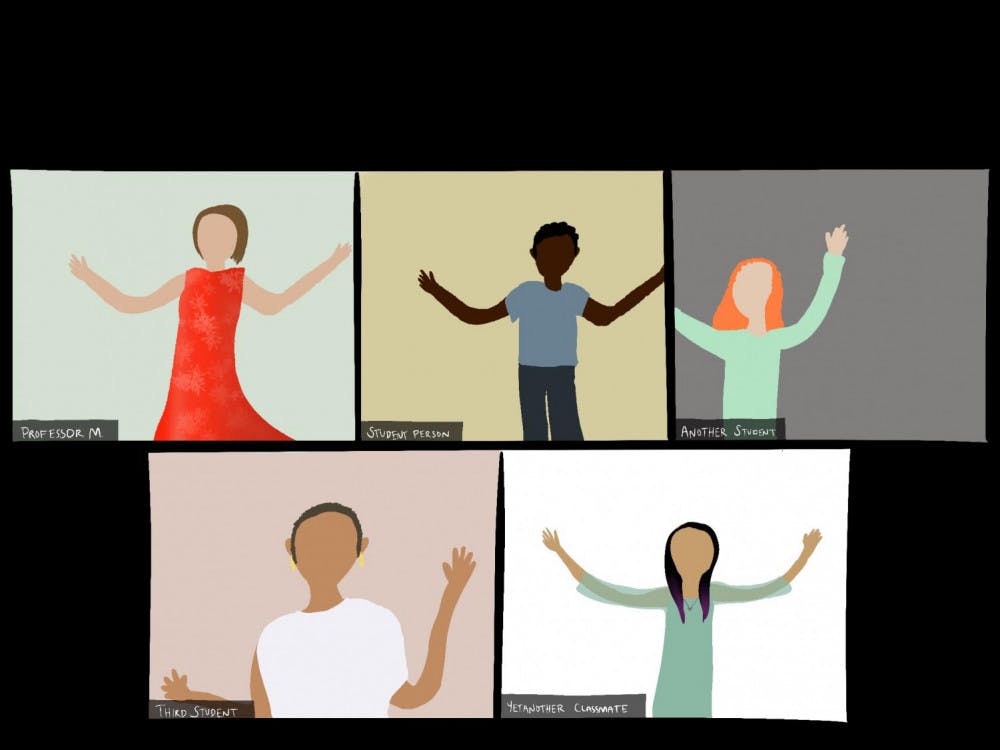When I was initially let into the Zoom for “Writing the Body,” music started blasting and I rushed to find what I had accidentally started playing on my computer, quickly realizing it was my instructor's shared sound.
As squares of faces popped into the class, I scanned the screen for instruction. Before any introductions, Karima Borni, a scholar in residence in dance at Middlebury, backed away from her screen and told us to do the same. “Just let the music move you!”
“Writing the Body” is not a traditional class — in all the best ways. Borni intends for this dance class to “bridge body and voice through the mediums of dance, meditation and poetry” and to “facilitate the discovery of authentic artistic expression,” as indicated in her syllabus.
One of the most influential and beneficial parts of the course is the work done outside of class. We begin each day with a morning routine which includes the morning pages exercise, a movement practice (yoga) and a contemplative practice (sitting meditation). The “morning pages,” taken from Julia Cameron’s book “The Artist’s Way,” are three handwritten pages in our stream of consciousness, judgement-free and unedited.
The intention is that forcing ourselves to sit down and just write — even if you are just listing complaints or to-do list items — will start to uncover the artist within you, unleashing creativity in other aspects of your life. It is difficult (and not just because of how much my hand hurts from physically writing instead of typing), but this practice can be beneficial for anyone.
Once a week, we implement one of Cameron’s other suggestions: the artist date, a two-hour block of time each week to devote to our inner artist. It is up to us to determine what will inspire our curiosity, with the hope that we will venture outside of our comfort zones. I ended up taking my inner artist on an icy cold walk, breathing in fresh air, while I listened to an audiobook. Then I came home, made myself some chamomile tea, and read a book of Jericho Brown’s poetry.
Our in-class work is equally influential, challenging and inspiring. Our first dance party was just the beginning of our movement on screen together. Borni emphasizes the importance of moving away from our screens, allowing us to connect more freely and completely to our own bodies. Knowing we are all dancing in our own worlds alleviates any tension and awkwardness, and there is still a feeling of connection between us all as we move to the same music.
On the first day of class, Borni mentioned that she felt she was going out on a bit of a limb teaching this class, and I am so glad she was willing to take that chance. There is nothing more useful and beneficial than learning about yourself and spending time with the creative parts of you that often get left behind in a world that emphasizes productivity and the analytical mind.
Writing every day, making time to spend with and inspire myself and connecting with my body through movement have always been desires of mine, but they always felt like unattainable goals. This course handed them to me on a silver platter and turned them from goals into processes, and from unattainable to excitingly possible. “Writing the Body” is more than just a class, it is an experience, and I hope to see more classes like it emerge at Middlebury.

Summer Hornbostel '22 is an Arts & Culture editor.
Hornbostel started writing for the Campus last year but will now focus her energy into her new role as editor. She is majoring in English and writing a collection of poetry for her thesis this fall. In the summer of 2021, she worked as a music journalist for an online publication called The Garnette Report where she covered stories on rising musical artists.




